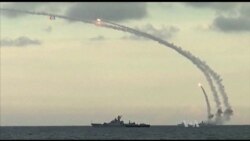World leaders on Wednesday scrambled to defuse tensions over Turkey’s shoot-down of a Russian fighter jet flying over the Syrian-Turkish border amid concerns that the conflict in Syria could quickly deteriorate into a larger, regional war.
With so many actors in the skies and on the ground in Syria – Russia, Iran, Turkey, U.S. and coalition partners, and their proxy rebel and government factions – analysts have been warning of the conflict erupting far beyond Syria’s borders.
Aware of the dangers, U.S. Secretary of State John Kerry on Wednesday got on the phone with Russian Foreign Minister Lavrov and stressed the need for both sides “not to allow this incident to escalate tensions.”
In Germany, French President Francois Hollande, speaking at a joint news conference with German Chancellor Angela Merkel, said “we must do all we can to de-escalate and to renew dialogue.”
Talking to journalists the same day, Russian Foreign Minister Sergei Lavrov insisted the downing of the warplane looked like “a planned provocation” yet said Moscow would not go to war with Turkey, a NATO member.
Instead Russia responded by sending more firepower to its base in Latakia, Syria, including its S-400 defense missile system, and renewing its bombing of anti-Assad rebel areas near where the Russian jet went down.
Risks of wider war
The rancor between Ankara and Moscow has weakened hopes that French President Francois Hollande will be able to pull together a “grand coalition” of countries – including Russia -- against Islamic State extremists after the lethal IS attack in Paris.
And with all parties now on the defensive, the risks of a wider war have increased, warned Stratfor military analyst Omar Lamrani.
“There is a lot of room for miscalculation, and in this type of environment, miscalculation could abruptly lead to escalation, which might lead us to a worst case scenario,” Lamrani told VOA via Skype.
The United States is working hard to avoid turning the Syria conflict “into a hot war with Russia,” said Lamrani. “But we do have to think of a scenario of a regional war.”
While France and the United States are clear that their objectives in Syria are to defeat Islamic State, on the ground the conflict is a lot more nuanced.
“We have a situation where people are fighting against the Islamic State and having deals with them as well,” said Lamrani. “The United States does not do that, but certainly many actors on the ground, from the Assad regime to Turkey to the rebels, do that.”
Russia's motive
Some analysts also see Moscow’s intervention in the Syrian conflict as a move far beyond its stated purpose of keeping its ally Syrian leader Bashar al Assad in power.
According to the Institute for the Study of War, prior to Monday’s incident, Russia had repeatedly harassed U.S. and Turkish aircraft and violated Turkish airspace.
“Putin aims to disrupt NATO fundamentally as part of a larger effort to recoup Russia’s losses following the collapse of the Soviet Union,” ISW said.
Stephen Blank, an American Foreign Policy Council expert, said Russia is just beginning to realize how expensive it is to get militarily involved in the Middle East.
“I think the Russians were trying to warn the Turks not to support Syria, and I think they got a very serious lesson that you do not start up with the Turkish military. And this should be a lesson to Moscow that intervening in Syria has cost above and beyond what they had anticipated,” Blank said.
The Islamic State group has taken advantage of the chaos in Syria and sectarian divides in Iraq to seize large tracts of land in both countries, set up a brutally-enforced quasi-state and actively sponsor terrorist attacks abroad.
Jeff Seldin contributed to this report.







